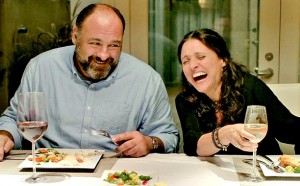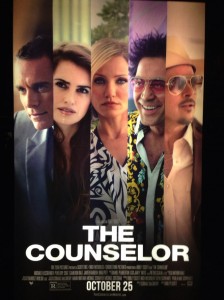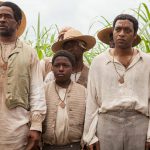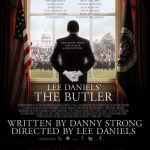Black Reel Awards 2014: 12 Years a Slave Breaks the Record
Posted on February 17, 2014 at 1:37 pm
 I always look forward to the announcement of the Black Reel Awards, which each year pay tribute to the greatest achievements of African-Americans and people of the African Diaspora in feature and independent films and television. This year, I was especially interested in the results because 2013 was unquestionably the best year in history for African-Americans in film — behind the screen, on the screen, and in the range of stories presented, from the real-life tragedies of “12 Years a Slave,” “Fruitvale Station,” and “Captain Phillips” to the genre films that may not have had lofty artistic aspirations but still gave African-American performers and film-makers a wider range of opportunities to tell their stories, even thrillers and romantic comedies.
I always look forward to the announcement of the Black Reel Awards, which each year pay tribute to the greatest achievements of African-Americans and people of the African Diaspora in feature and independent films and television. This year, I was especially interested in the results because 2013 was unquestionably the best year in history for African-Americans in film — behind the screen, on the screen, and in the range of stories presented, from the real-life tragedies of “12 Years a Slave,” “Fruitvale Station,” and “Captain Phillips” to the genre films that may not have had lofty artistic aspirations but still gave African-American performers and film-makers a wider range of opportunities to tell their stories, even thrillers and romantic comedies.
“12 Years a Slave,” a stunning achievement with a good chance of winning this year’s Best Picture Oscar, was the big winner at the Black Reel Awards, breaking the all-time record set by “Precious” with a sweep of eight awards: Outstanding Motion Picture, outstanding actor for Chiwetel Ejiofor, Outstanding Supporting Actress for dazzling newcomer Lupita Nyong’o, who also won Outstanding Female Breakthrough Performance, Outstanding Director for Steve McQueen, Outstanding Screenplay for John Ridley, Outstanding Ensemble, and Outstanding Score for Hans Zimmer. “The fact that in one of the strongest years for Black film in recent memory, one film was able to be so dominant is a testament to the vision of Steve McQueen, the screenplay by John Ridley and the fantastic performances of the trio of actors led by Chiwetel Ejiofor and Lupita Nyong’o,” said Black Reel Awards creator and Executive Director, Tim Gordon. “This will be a year no one forgets.”
Other notable awards went to “Captain Phillips'” Barkhad Abdi (Outstanding Supporting Actor and Outstanding Male Breakthrough Performance) and Danai Gurira (Outstanding Actress) for her role in “Mother of George,” the story of Nigerian immigrants living in Brooklyn and struggling with infertility. Documentary honors went to “20 Feet from Stardom,” about the back-up singers who perform on hit records and are usually overlooked. A documentary about gay rights in the African-American community, “The New Black,” won the award for Outstanding Independent Documentary. Outstanding Independent Feature went to “Blue Caprice,” the story of the DC snipers.
The full list of awardees:
Outstanding Motion Picture
12 Years a Slave
Outstanding Actor
Chiwetel Ejiofor | 12 Years a Slave
Outstanding Actress
Danai Gurira | Mother of George
Outstanding Supporting Actor
Barkhad Abdi | Captain Phillips
Outstanding Supporting Actress
Lupita Nyong’o | 12 Years a Slave
Outstanding Director
Steve McQueen | 12 Years a Slave
Outstanding Screenplay
John Ridley | 12 Years a Slave
Outstanding Documentary
20 Feet From Stardom | Morgan Neville
Outstanding Ensemble
12 Years a Slave | Francine Maiser
Outstanding Foreign Film
War Witch | Canada
Outstanding Score
Hans Zimmer | 12 Years a Slave
Outstanding Original Song
“Desperation” by Judith Hill | 20 Feet From Stardom
Outstanding Breakthrough Performance, Male
Barkhad Abdi | Captain Phillips
Outstanding Breakthrough Performance, Female
Lupita Nyong’o | 12 Years a Slave
Outstanding Voice Performance
Samuel L. Jackson | Turbo
Outstanding Independent Feature
Blue Caprice | Alexandre Moors
Outstanding Independent Documentary
The New Black | Yoruba Richen
Outstanding Independent Short
Black Girl in Paris | Kiandra Parks
Outstanding Television Documentary
Whoopi Goldberg Presents Moms Mabley | Whoopi Goldberg
Outstanding TV Movie or Mini-Series
Mike Tyson: Undisputed Truth
Outstanding TV Movie Actor
Chiwetel Ejiofor | Dancing on Edge
Outstanding TV Movie Actress
Anika Noni Rose | The Watsons Go to Birmingham
Outstanding Supporting Actor, TV Movie
Omari Hardwick | Being Mary Jane
Outstanding Supporting Actress, TV Movie
Octavia Spencer | Call Me Crazy: A Five Film
Outstanding Director, TV Movie
Spike Lee | Mike Tyson: Undisputed Truth
Outstanding Screenplay, TV Movie
Mara Brock Akil | Being Mary Jane






